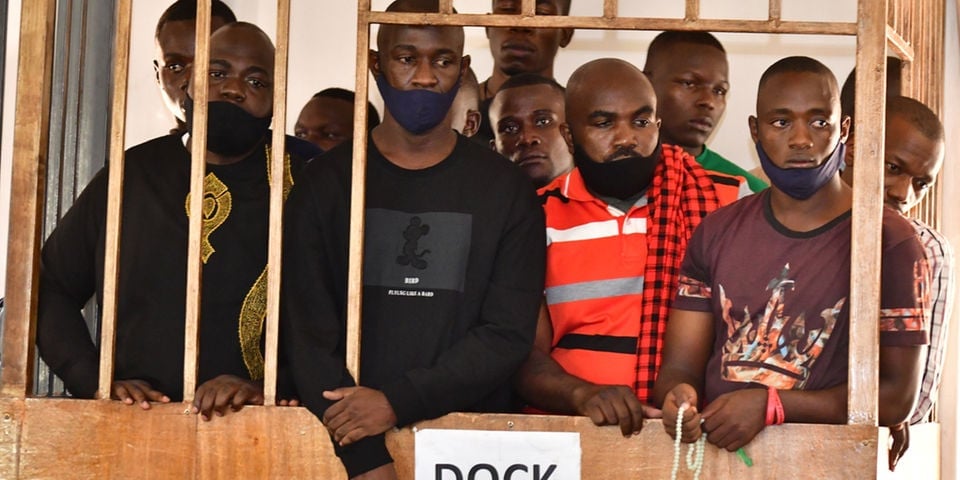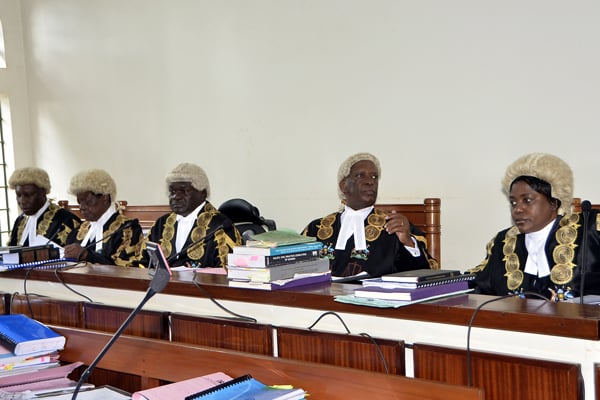Prime
Trial of civilians in military courts illegal, judges rule

A file photo showing supporters of the National Unity Platform (NUP) in the dock before the military court at Makindye, Kampala. The Constitutional Court has in a land mark judgment ruled that trying civilians in military courts is unconstitutional. PHOTO/ FILE
What you need to know:
- In a majority decision of three to two, the justices held that under the 1995 Constitution, trying civilians is the role of civilian courts of judicature.
- In their petition filed in 2015, more than 100 people led by Capt (rtd) Amon Byarugaba Hasibu Kasiita and Mathias Rugira contended that military courts have exercised criminal jurisdiction over civilians, which is in contravention of the Constitution, which requires them to be tried by a civilian court or tribunal authorised by law.
The Constitutional Court has in a land mark judgment ruled that trying civilians in military courts is unconstitutional.
In a majority decision of three to two, the justices held that under the 1995 Constitution, trying civilians is the role of civilian courts of judicature.
“I would declare that the UPDF Act, 2005 to the extent that it may be understood as conferring jurisdiction on military courts to try civilians is unconstitutional and therefore null and void,” Justice Elizabeth Musoke, who wrote the lead judgment, ruled.
To that effect, the court ordered that criminal cases in which civilians were being charged before the military courts and are pending trial or have been partly tried, should immediately be transferred to a competent civilian courts and also be taken over by the Director of Public Prosecutions (DPP).
The court clarified that those cases that were concluded and sentences passed prior to this decision are not affected.
“I would order that the convictions and sentences of civilians which arose from criminal cases tried by military courts prior to the date of this judgment, are valid. However, in future any trial of civilians by military courts and any decision that may be taken at such trials to convict and or sentence civilians shall from the date of this judgment be invalid, null and void,” Justice Musoke said.
Justices Kenneth Kakuru and Geoffrey Kiryabwire consented while Deputy Chief Justice Richard Buteera and Monica Mugenyi dissented.
The court held that military courts are intended as disciplinary courts for the Uganda People’s Defence Forces (UPDF) to ensure discipline among the soldiers.
In their petition filed in 2015, more than 100 people led by Capt (rtd) Amon Byarugaba Hasibu Kasiita and Mathias Rugira contended that military courts have exercised criminal jurisdiction over civilians, which is in contravention of the Constitution, which requires them to be tried by a civilian court or tribunal authorised by law.
Through their lawyers of Rwakafuzi and Co Advocates, the group sought for a declaration that military courts are not independent and impartial as required by law.
The petitioners contended that military courts are ill-suited for trying civilians in criminal cases as army courts are empaneled by non-lawyers with grave difficulty in appreciating complex issues of evidence.
They further stated that the nature of criminal trials in military courts is such that civilians charged are only allowed military lawyers whose allegiance is to the military. However, the Attorney General (AG) unsuccessfully opposed the petition and denied any violation of Article 209 of the Constitution by section 119(1) of the UPDF Act reasoning that military courts do have jurisdiction to try civilians who either aid and abet a person subject to military law in the commission of a service offence or are found in unlawful possession of classified stores.
The AG further argued that section 119(1)(h) of the UPDF Act does not create offences but merely delineates persons that are subject to military law while section 197 of the UPDF Act confers unlimited jurisdiction on the General Court Martial to try civil offences within the confines of section 179 of the same Act.





